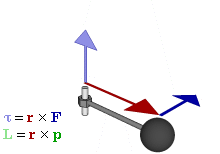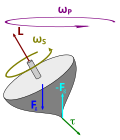Torque
Torque[edit]

Torque, also known as moment of force, is the rotational equivalent of linear force. It represents the tendency of a force to rotate an object about an axis, fulcrum, or pivot. Just as a force is a push or a pull, a torque can be thought of as a twist to an object.
Definition[edit]
Torque is defined mathematically as the cross product of the position vector (distance from the axis of rotation) and the force vector. The formula for torque \( \tau \) is given by:
\[ \tau = \mathbf{r} \times \mathbf{F} \]
where \( \mathbf{r} \) is the position vector and \( \mathbf{F} \) is the force vector. The magnitude of the torque is given by:
\[ \tau = rF \sin \theta \]
where \( r \) is the distance from the axis of rotation to the point where the force is applied, \( F \) is the magnitude of the force, and \( \theta \) is the angle between the position vector and the force vector.

Units[edit]
The SI unit for torque is the newton metre (Nm). In the imperial system, torque is often measured in pound-feet (lb-ft).
Moment Arm[edit]
The moment arm is the perpendicular distance from the axis of rotation to the line of action of the force. It is a crucial component in calculating torque, as it determines the effectiveness of the force in producing rotational motion.

Applications[edit]
Torque is a fundamental concept in mechanics and is applied in various fields such as engineering, physics, and automotive industries. It is essential in the design and analysis of machines, engines, and structures.
Precession[edit]
Torque is also responsible for the phenomenon of precession, which is the change in the orientation of the rotational axis of a rotating body. This is commonly observed in gyroscopes and spinning tops.

Torque in Vehicles[edit]
In the context of automobiles, torque is a measure of an engine's ability to do work. It is a critical factor in determining a vehicle's performance, particularly in terms of acceleration and towing capacity.

Related Pages[edit]
References[edit]
- Halliday, D., Resnick, R., & Walker, J. (2013). Fundamentals of Physics. Wiley.
- Tipler, P. A., & Mosca, G. (2008). Physics for Scientists and Engineers. W. H. Freeman.
-
Torque animation
-
Torque, position, and force
-
Moment arm
-
Precession of a top
-
Torque curve
Ad. Transform your life with W8MD's Budget GLP-1 injections from $75


W8MD offers a medical weight loss program to lose weight in Philadelphia. Our physician-supervised medical weight loss provides:
- Weight loss injections in NYC (generic and brand names):
- Zepbound / Mounjaro, Wegovy / Ozempic, Saxenda
- Most insurances accepted or discounted self-pay rates. We will obtain insurance prior authorizations if needed.
- Generic GLP1 weight loss injections from $75 for the starting dose.
- Also offer prescription weight loss medications including Phentermine, Qsymia, Diethylpropion, Contrave etc.
NYC weight loss doctor appointmentsNYC weight loss doctor appointments
Start your NYC weight loss journey today at our NYC medical weight loss and Philadelphia medical weight loss clinics.
- Call 718-946-5500 to lose weight in NYC or for medical weight loss in Philadelphia 215-676-2334.
- Tags:NYC medical weight loss, Philadelphia lose weight Zepbound NYC, Budget GLP1 weight loss injections, Wegovy Philadelphia, Wegovy NYC, Philadelphia medical weight loss, Brookly weight loss and Wegovy NYC
|
WikiMD's Wellness Encyclopedia |
| Let Food Be Thy Medicine Medicine Thy Food - Hippocrates |
Medical Disclaimer: WikiMD is not a substitute for professional medical advice. The information on WikiMD is provided as an information resource only, may be incorrect, outdated or misleading, and is not to be used or relied on for any diagnostic or treatment purposes. Please consult your health care provider before making any healthcare decisions or for guidance about a specific medical condition. WikiMD expressly disclaims responsibility, and shall have no liability, for any damages, loss, injury, or liability whatsoever suffered as a result of your reliance on the information contained in this site. By visiting this site you agree to the foregoing terms and conditions, which may from time to time be changed or supplemented by WikiMD. If you do not agree to the foregoing terms and conditions, you should not enter or use this site. See full disclaimer.
Credits:Most images are courtesy of Wikimedia commons, and templates, categories Wikipedia, licensed under CC BY SA or similar.
Translate this page: - East Asian
中文,
日本,
한국어,
South Asian
हिन्दी,
தமிழ்,
తెలుగు,
Urdu,
ಕನ್ನಡ,
Southeast Asian
Indonesian,
Vietnamese,
Thai,
မြန်မာဘာသာ,
বাংলা
European
español,
Deutsch,
français,
Greek,
português do Brasil,
polski,
română,
русский,
Nederlands,
norsk,
svenska,
suomi,
Italian
Middle Eastern & African
عربى,
Turkish,
Persian,
Hebrew,
Afrikaans,
isiZulu,
Kiswahili,
Other
Bulgarian,
Hungarian,
Czech,
Swedish,
മലയാളം,
मराठी,
ਪੰਜਾਬੀ,
ગુજરાતી,
Portuguese,
Ukrainian




